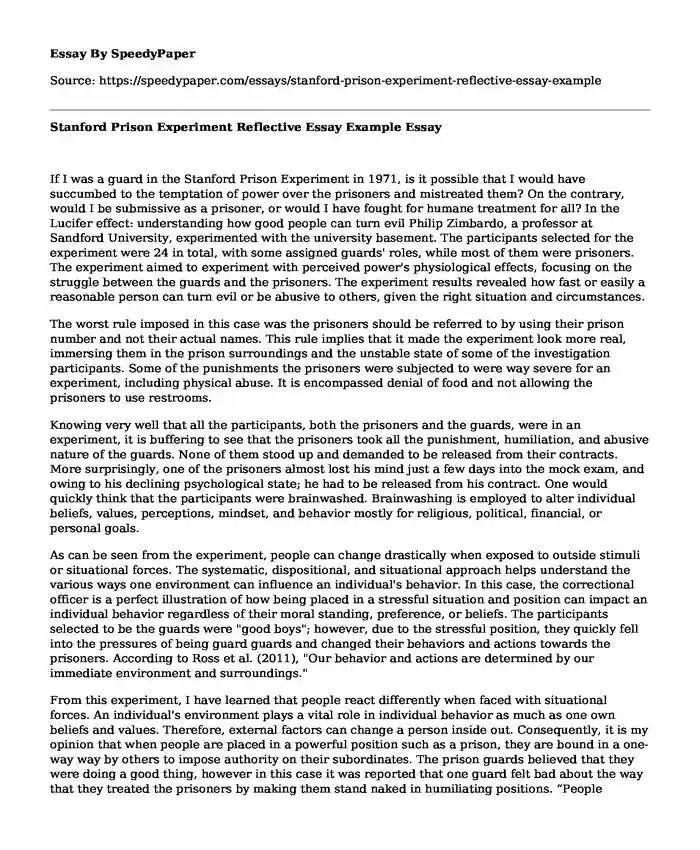
| Essay type: | Reflective essays |
| Categories: | Psychology Sociology Behavior |
| Pages: | 3 |
| Wordcount: | 771 words |
If I was a guard in the Stanford Prison Experiment in 1971, is it possible that I would have succumbed to the temptation of power over the prisoners and mistreated them? On the contrary, would I be submissive as a prisoner, or would I have fought for humane treatment for all? In the Lucifer effect: understanding how good people can turn evil Philip Zimbardo, a professor at Sandford University, experimented with the university basement. The participants selected for the experiment were 24 in total, with some assigned guards' roles, while most of them were prisoners. The experiment aimed to experiment with perceived power's physiological effects, focusing on the struggle between the guards and the prisoners. The experiment results revealed how fast or easily a reasonable person can turn evil or be abusive to others, given the right situation and circumstances.
The worst rule imposed in this case was the prisoners should be referred to by using their prison number and not their actual names. This rule implies that it made the experiment look more real, immersing them in the prison surroundings and the unstable state of some of the investigation participants. Some of the punishments the prisoners were subjected to were way severe for an experiment, including physical abuse. It is encompassed denial of food and not allowing the prisoners to use restrooms.
Knowing very well that all the participants, both the prisoners and the guards, were in an experiment, it is buffering to see that the prisoners took all the punishment, humiliation, and abusive nature of the guards. None of them stood up and demanded to be released from their contracts. More surprisingly, one of the prisoners almost lost his mind just a few days into the mock exam, and owing to his declining psychological state; he had to be released from his contract. One would quickly think that the participants were brainwashed. Brainwashing is employed to alter individual beliefs, values, perceptions, mindset, and behavior mostly for religious, political, financial, or personal goals.
As can be seen from the experiment, people can change drastically when exposed to outside stimuli or situational forces. The systematic, dispositional, and situational approach helps understand the various ways one environment can influence an individual's behavior. In this case, the correctional officer is a perfect illustration of how being placed in a stressful situation and position can impact an individual behavior regardless of their moral standing, preference, or beliefs. The participants selected to be the guards were "good boys"; however, due to the stressful position, they quickly fell into the pressures of being guard guards and changed their behaviors and actions towards the prisoners. According to Ross et al. (2011), "Our behavior and actions are determined by our immediate environment and surroundings."
From this experiment, I have learned that people react differently when faced with situational forces. An individual's environment plays a vital role in individual behavior as much as one own beliefs and values. Therefore, external factors can change a person inside out. Consequently, it is my opinion that when people are placed in a powerful position such as a prison, they are bound in a one-way way by others to impose authority on their subordinates. The prison guards believed that they were doing a good thing, however in this case it was reported that one guard felt bad about the way that they treated the prisoners by making them stand naked in humiliating positions. “People thinking of other people – if not reflecting on how they did some bad things to those people or so – tend either to see themselves as “good people”, or to see all people as good, or at least basically good, or to make a distinction between “good people” (usually “those good as we are”) and “bad people” (Zikic, 2016)
Before reading this case, I believed that due to my personal beliefs and morals, if I were a guard, I would not succumb to the prisoners' abuse and cruelty. However, after reading the case, I have realized that anything is possible. I believe that being placed in a situation and subjected to the right amount of stress and pressure can result in undesirable behaviors where anything is possible, even turning out to be an individual you do not recognize.
References
Ross, L., Nisbett, R. E., & Gladwell, M. (2011). The person and the situation: Perspectives of social psychology. London: Pinter & Martin.
Zikic, B. (2016). What Makes People Good or Bad? (Mis)Anthropological Essay on Searching for Social/ Cultural Reasons on Judging the Other People. Issues in Ethnology and Anthropology, 10(4), 927. https://doi.org/10.21301/eap.v10i4.8
Zimbardo, P. G. (2009). The Lucifer effect: Understanding how good people turn evil. London: Rider.
Cite this page
Stanford Prison Experiment Reflective Essay Example. (2024, Jan 02). Retrieved from https://speedypaper.net/essays/stanford-prison-experiment-reflective-essay-example
Request Removal
If you are the original author of this essay and no longer wish to have it published on the SpeedyPaper website, please click below to request its removal:
- Tips For Successful Interview Essay Samples
- Free Essay Example. Hireology Culture Analysis
- Paper Example. Understanding Social Media
- Organizational Behavior and Workplace Diversity. Free Essay
- Free Essay: Social Media Usage Among Young People
- Essay Example: Marijuana Legalization
- Report on Navigating Worldviews: A Personal Perspective, Christian Values, and Social Work Ethics
Popular categories




